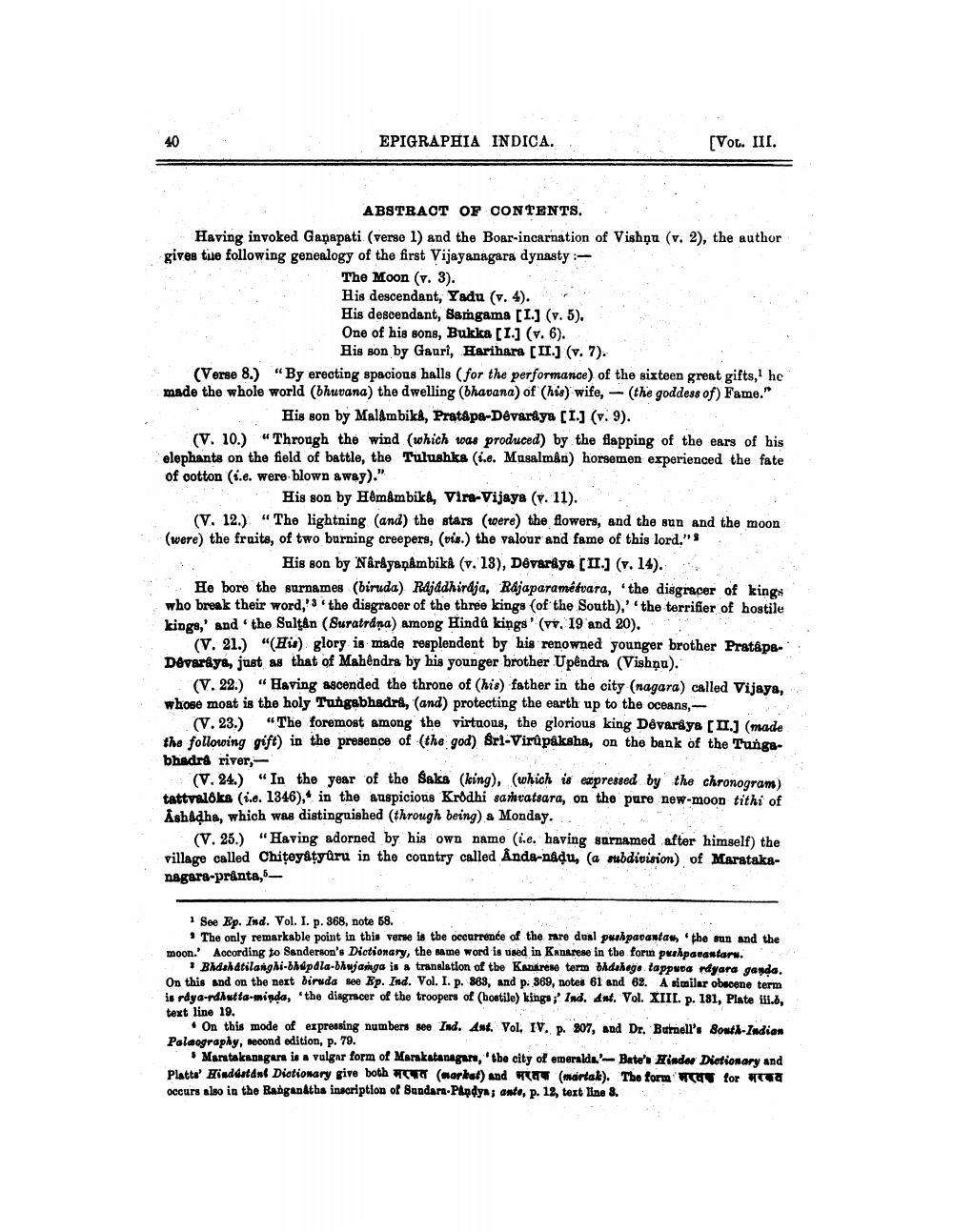________________
40
EPIGRAPHIA INDICA.
[VOL. III.
ABSTRACT OF CONTENTS.
Having invoked Ganapati (verse 1) and the Boar-incarnation of Vishnu (v. 2), the author gives the following genealogy of the first Vijayanagara dynasty :
The Moon (v. 3).
His descendant, Yadu (v. 4).
His descendant, Samgama [I.] (v. 5). One of his sons, Bukka [I.] (v. 6).
His son by Gauri, Harihara [II.] (v. 7).
(Verse 8.) "By erecting spacious halls (for the performance) of the sixteen great gifts,' he made the whole world (bhuvana) the dwelling (bhavana) of (his) wife, (the goddess of) Fame." His son by Malambika, Pratapa-Dêvaraya [I.] (v. 9).
(V. 10.) "Through the wind (which was produced) by the flapping of the ears of his elephants on the field of battle, the Tulushka (.e. Musalman) horsemen experienced the fate of cotton (i.e. were blown away)."
His son by Hêmâmbika, Vira-Vijaya (v. 11).
(V. 12.) "The lightning (and) the stars (were) the flowers, and the sun and the moon (were) the fruits, of two burning creepers, (vis.) the valour and fame of this lord."s
His son by Narayanambika (v. 13), Dêvaraya [II.] (v. 14).
He bore the surnames (biruda) Rájádhirája, Rájaparamésvara, the disgracer of kings who break their word,' the disgracer of the three kings (of the South),' the terrifier of hostile kings,' and 'the Sultan (Suratrána) among Hindû kings' (vv. 19 and 20).
(V. 21.) "(His) glory is made resplendent by his renowned younger brother PratapaDevaraya, just as that of Mahendra by his younger brother Upêndra (Vishnu).
(V. 22.) "Having ascended the throne of (his) father in the city (nagara) called Vijaya, whose moat is the holy Tungabhadra, (and) protecting the earth up to the oceans,
(V. 23.) "The foremost among the virtuous, the glorious king Devaraya [II.] (made the following gift) in the presence of (the god) Sri-Virûpâksha, on the bank of the Tunga
bhadra river,
(V. 24.) "In the year of the Saka (king), (which is expressed by the chronogram) tattvalóka (i.e. 1346), in the auspicious Krodhi samvatsara, on the pure new-moon tithi of Ashaḍha, which was distinguished (through being) a Monday.
(V. 25.) "Having adorned by his own name (i.e. having surnamed after himself) the village called Chiṭeyâtyûru in the country called Anda-nadu, (a subdivision) of Maratakanagara-pranta,—
1 See Ep. Ind. Vol. I. p. 368, note 58.
The only remarkable point in this verse is the occurrence of the rare dual pushpavantas, the sun and the moon. According to Sanderson's Dictionary, the same word is used in Kanarese in the form pushpavantaru.
1 Bhdshatilanghi-bhupdla-bhujamga is a translation of the Kanarese term bhdsheğe tappava rayara ganda. On this and on the next biruda see Ep. Ind. Vol. I. p. 363, and p. 369, notes 61 and 62. A similar obscene term is rdya-rdhutta-minda, 'the disgracer of the troopers of (hostile) kings; Ind. Ant. Vol. XIII. p. 181, Plate iii.b, text line 19.
On this mode of expressing numbers see Ind. Ant. Vol. IV. p. 207, and Dr. Burnell's South-Indian Palaography, second edition, p. 79.
Maratakanagara is a vulgar form of Marakatanagara, 'the city of emeralda.- Bate's Hindee Dictionary and Platts' Hindistant Dictionary give both (market) and (martak). The form for occurs also in the Ranganatha inscription of Sundara-Pandya; ante, p. 12, text line 3.




